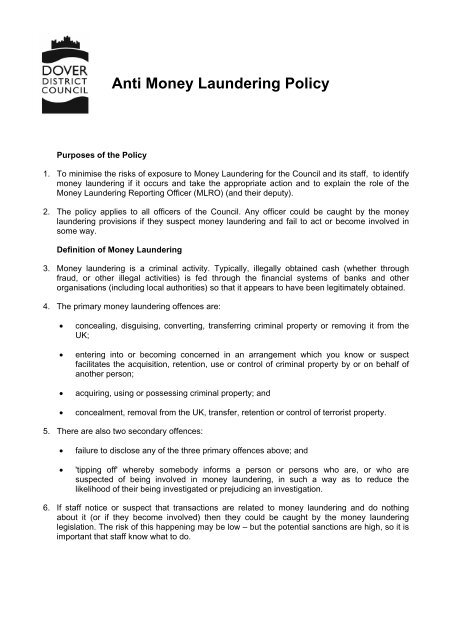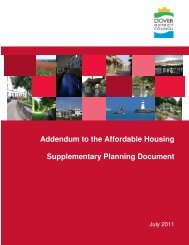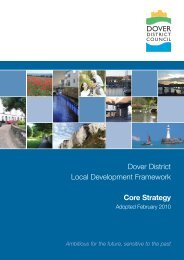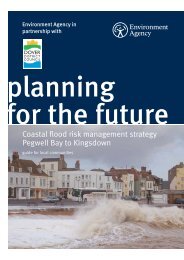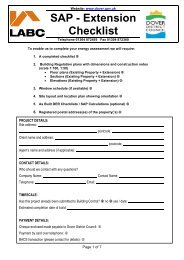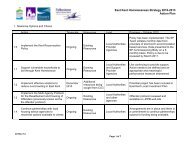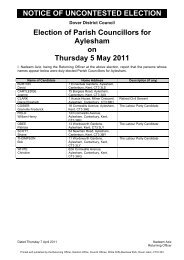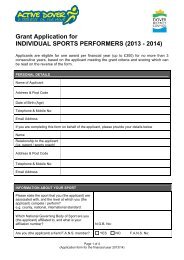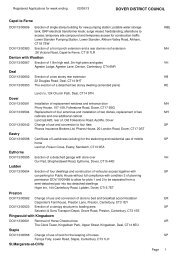Anti Money Laundering Policy - Dover District Council
Anti Money Laundering Policy - Dover District Council
Anti Money Laundering Policy - Dover District Council
Create successful ePaper yourself
Turn your PDF publications into a flip-book with our unique Google optimized e-Paper software.
<strong>Anti</strong> <strong>Money</strong> <strong>Laundering</strong> <strong>Policy</strong>Purposes of the <strong>Policy</strong>1. To minimise the risks of exposure to <strong>Money</strong> <strong>Laundering</strong> for the <strong>Council</strong> and its staff, to identifymoney laundering if it occurs and take the appropriate action and to explain the role of the<strong>Money</strong> <strong>Laundering</strong> Reporting Officer (MLRO) (and their deputy).2. The policy applies to all officers of the <strong>Council</strong>. Any officer could be caught by the moneylaundering provisions if they suspect money laundering and fail to act or become involved insome way.Definition of <strong>Money</strong> <strong>Laundering</strong>3. <strong>Money</strong> laundering is a criminal activity. Typically, illegally obtained cash (whether throughfraud, or other illegal activities) is fed through the financial systems of banks and otherorganisations (including local authorities) so that it appears to have been legitimately obtained.4. The primary money laundering offences are:concealing, disguising, converting, transferring criminal property or removing it from theUK;entering into or becoming concerned in an arrangement which you know or suspectfacilitates the acquisition, retention, use or control of criminal property by or on behalf ofanother person;acquiring, using or possessing criminal property; andconcealment, removal from the UK, transfer, retention or control of terrorist property.5. There are also two secondary offences:failure to disclose any of the three primary offences above; and'tipping off' whereby somebody informs a person or persons who are, or who aresuspected of being involved in money laundering, in such a way as to reduce thelikelihood of their being investigated or prejudicing an investigation.6. If staff notice or suspect that transactions are related to money laundering and do nothingabout it (or if they become involved) then they could be caught by the money launderinglegislation. The risk of this happening may be low – but the potential sanctions are high, so it isimportant that staff know what to do.
13. Acceptable evidence of address would include (original documents only):Any untility bill (in clients name, no more than 3 months old)Bank / building society statement (not if more than 3 montsh old, and not if also used toprove identity)Letter from a solicitorLetter from Revenue and Customs or other government office.14. Details of these checks must be retained for 5 years. If these checks are not satisfactory, nofurther business can take place.What happens if we suspect money laundering15. Staff may suspect money laundering as a result of the checks set out above. However, theymay also suspect it through other transactions or activities outside of these checks.16. Once money laundering is suspected:Staff must report their concerns promptly to the MLRO or the Deputy MLRO eitherverbally or using the attached pro forma (Annex 1).Staff must follow the directions of the MLRO.Staff Must not discuss the matter with the suspected money launderer, or any otherperson. Nor should they make file notes of leave any evidence of their concerns availablefor others to see. Such actions could be considered to be "tipping off", which can result ina maximum penalty of 5 years imprisonment.The MLRO must decide whether the case warrants a disclosure report to the relevantauthorities (the Serious and Organised Crime Authority or their successor).If the MLRO decides a disclosure is appropriate, or that they have reasonable grounds tobelieve that someone is engaged in money laundering and they do not make a disclosure,then they will be committing a criminal offence.Staff Awareness17. All staff should be made aware of this policy. Staff most likely to encounter money launderingshould receive training in the policy and should be aware of the requirements of:The Terrorism Act 2000, sections 18 & 21a The <strong>Anti</strong>-Terrorism, Crime and Security Act 2001, section 117 The Proceeds of Crime Act 2002, part 7 The <strong>Money</strong> <strong>Laundering</strong> Regulations 2007.
Report of Suspected <strong>Money</strong> <strong>Laundering</strong>ANNEX 1CONFIDENTIALReport to the <strong>Money</strong> <strong>Laundering</strong> Reporting OfficerReport of <strong>Money</strong> <strong>Laundering</strong> ActivityTo:<strong>Money</strong> <strong>Laundering</strong> Reporting Officer – Director of Finance, Housing and CommunityDeputy <strong>Money</strong> <strong>Laundering</strong> Reporting Officer – Financial Services ManagerFrom: ________________________________Directorate: ________________________________[insert post title]Ext/Tel No: ________________________________URGENT YES/NODate by which response needed: _______________Details of suspected offence:Name(s) and address(es) of person(s) involved:[if a company/public body please include details of nature of business]Nature, value and timing of activity involved:[Please include full details e.g. what, when, where, how. Continue on a separate sheet ifnecessary]
Nature of suspicions regarding such activity:[Please continue on a separate sheet if necessary]Has any investigation been undertaken (as far as you are aware)? [Delete as appropriate]Yes / NoIf yes, please include details below:Have you discussed your suspicions with anyone else?[Delete as appropriate]Yes / NoIf yes, please specify below, explaining why such discussion was necessary:
Please set out below any other information you feel is relevant:Signed: _________________________ Dated: _______________________Please do not discuss the content of this report with anyone you believe to be involved in thesuspected money laundering activity described. To do so may constitute a tipping off offence,which carries a maximum penalty of 5 years' imprisonment.THE FOLLOWING PART OF THIS FORM TO BE COMPLETED BY THE MLRODate report received: _____________________________Date receipt of from acknowledged: _____________________________CONSIDERATION OF DISCLOSURE:Action plan:OUTCOME OF CONSIDERATION OF DISCLOSURE:Are there reasonable grounds for suspecting money-laundering activity?
If there are reasonable grounds for suspicion, will a report be made to the NCIS? [Delete asappropriate]Yes / NoIf yes, please confirm date of report to NCIS: and complete the box below:Details of liaison with the NCIS regarding the report:Notice Period: from: to:Moratorium Period: from:to:Is consent required from the SOCA to any ongoing or imminent transactions which wouldotherwise be prohibited acts? [Delete as appropriate]Yes / NoIf yes, please confirm full details in the box below:Date consent received from SOCA:Date consent given by you to employee:If there are reasonable grounds to suspect money laundering, but you do not intend to report thematter to the SOCA, please set out below the reason(s) for non-disclosure:[Please set out any reasonable excuse for non-disclosure]Date consent given by you to employee for any prohibited act transactions to proceed:
Other relevant information:Signed: ______________________ Dated: _____________________THIS REPORT TO BE RETAINED FOR AT LEAST FIVE YEARS


